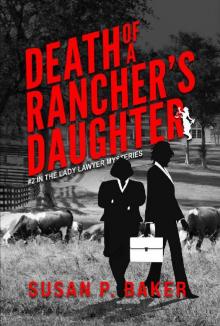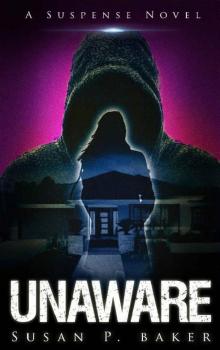- Home
- Susan P. Baker
Suggestion of Death Page 11
Suggestion of Death Read online
Page 11
Betty Lou appeared harmless, though he’d seen her when she was angry and remembered what that was like. He pulled on the knot at his neck and sat back in a kitchen chair. Although there was no microwave or dishwasher, which was a dead giveaway the apartments were public housing, the kitchen had Formica counters over faux wood cabinets. The stove and woodwork shined, as did the floor. Fresh paint covered the walls, the smell hanging in the air. Clean dishes sat in a rack on a drain board on the left side of the double sink. It might be barely large enough to turn around in, but the kitchen was well done.
“That’s mighty nice of you, Ms. Johnson. I could wet my whistle about now.”
“So tell me, what exactly are you writing about?” She poured tea over crackling ice in a tall glass and set it before Jim. Ambling back to the refrigerator as if she hadn’t anything better to do with her time, Betty Lou pulled out a lemon, sliced it into a milk-glass bowl, and set it and a sugar bowl in front of Jim.
Her friendliness made him feel safe about being honest with her. “Well, ma’am, I guess it won’t hurt to tell you I’m a writer but also one of the men who can’t pay his child support.”
“Ah hah.” She picked up her glass and came over to the table, sitting down opposite Jim. “I’m willing to hear more, go on.”
He talked as fast as he could since he detected a hint of impatience now that he’d confessed. “I got this idea that most of the newspaper and magazine articles, and even the TV programs like 60 Minutes and 48 Hours, always show the woman’s view of the child support situation.” He squeezed lemon into his tea instead of meeting her eyes.
“Let me get you a spoon.” She eased up from the table and opened a drawer and handed him a white plastic spoon.
“I thought I might be able to make a sale if I showed the man’s viewpoint. He stirred and prayed that she heard the word ‘sale’ in his explanation. “Sell an article so I can pay my own child support.”
“Ah-hah,” she said again and sat silent until he looked up. “And what is the man’s view, Mr. Dorman?”
“I just meant how each man got in that situation. This tea’s good, by the way.”
“Now don’t you go trying to butter me up. You know, I don’t think you’re going to be able to sell a story that is full of a man’s excuses why he can’t make sure his kids have food on the table.” She banged the table with her fist.
She was beginning to sound like the woman he’d seen in court. “Ma’am, I didn’t mean to upset you or make you angry, I’m just trying to make a living so I can pay what I owe.” He grinned what he thought of as his most disarming grin. His stomach rumbled as the cold tea hit it.
She let loose with a loud sigh and leaned back in her chair. “Didn’t mean to get so worked up. My husband just gave me such a hard time all them years. It was hard to raise children that-a-way.”
“Looks like you’re doing okay now, though. All those kids in the living room yours?”
She nodded. “We’re doing fine now. He died, you know.”
He maintained eye contact and a poker face even though he would have loved to ask her how she felt about the man dying. Didn’t look like she much cared. “Yes, ma’am, I do know. What happened to him, if you don’t mind my asking?” Jim took a long swallow of his tea and studied her face at the same time.
“Accident out on the highway. I had to go down to that morgue and identify the body ‘cause his mama wouldn’t go. She’s old and half blind. Poor thing. Can’t really blame her.” She cocked her head and shrugged. “But he was a mess, I tell you. Roasted like a side of beef on a spit. Somehow his car caught fire after it hit a tree. I wouldn’t have wanted the kids to see him like that even if I did hate his guts.”
Jim was glad it was mid-morning, and he wasn’t about to eat. “How did you identify him then?”
“His ring. His wedding ring. Can’t believe he hadn’t hocked it, but it was right there on his overcooked finger.”
Jim flinched. Her description was a vision he hoped he’d soon forget. “Had he been drinking?”
“I think so, yeah. That was always his favorite pastime. He was a beeraholic. That’s like an alcoholic except with beer. I tell you, he couldn’t live without his beer, but when we was married if I so much as mentioned that he was a drunk or an alcoholic, he’d slap me upside my head.” She sighed. “He was a mean man, Mr. Dorman. I can’t say I’m sorry he’s gone.”
No wonder people thought the children would be better off if Johnson were dead. “Mind if I take some notes?”
“No, you go ahead. Let me freshen up your tea.” She got up from the table and kept silent while refilling his glass.
Jim kept his head down and wrote on his pad. When she sat back down, he assumed his reporter’s nonjudgmental persona. He asked her some questions about how they had met, when they had gotten married, and what each of them had done for a living back then. In a few minutes, he had enough background to discuss what happened after the divorce.
“At the time you divorced him, Ms. Johnson, what was your husband doing for a living?”
“Carpenter. It had fallen off a little. I wasn’t sure if it was because he drank so much or ‘cause everything was going bust, but he was working eighty percent of the time.” She doodled a finger in sugar that had spilled on the table.
“How much child support did the judge order?”
“Well, my lawyer and his lawyer agreed on twenty-five dollars a week for each child. Today that wouldn’t even feed a kid. Didn’t do that much more then. Tommy was a baby, not even out of diapers.” Her face screwed up. “Hell, diapers ‘bout cost that much.”
“But you couldn’t stay married?”
“I tried. He wouldn’t go to no counseling.” Shrugging, she pulled on the corner of the dishtowel still tied around her waist, loosening some threads. “Said I was the one with the problem. Yeah, big problem, him hitting me was my problem. I got sick of it. So I left and took my kids. He made better money than me by a long shot, but I couldn’t risk him ever beating up on the kids.”
“He didn’t fight you for them?”
She shook her head. “He said some awful, threatening things, but he didn’t really mean it. He couldn’t raise them kids, he just wanted to scare the daylights out of me. But you know what?”
“What?”
“If he’d of tried to really take the kids away, I’d of killed him.”
Jim’s muscles tightened like he’d just caught a hard thrown football with his stomach. “Really?”
“Really. Once I got myself together, I knew I was strong enough to take care of all of us. You gitting all this?”
Jim licked his lips as he wrote. She seemed to be the mother-animal-protects-her-cub type. He liked her, thought she probably was typical of the lower middle-class American mother, making out the best she could.
“So you want to know when he first missed a child support payment?”
“Sure.” If everyone he wanted to interview would volunteer information so readily, his job would be a lot easier. He suspected the women would, since women liked to share their problems more than men did. It would be hard to get the men talking, so he wanted to prompt them with comments from their ex-wives. He flipped over a page in his notepad and waited.
Betty Lou snorted. “That son-of-a-bitch. When we was separated and he was supposed to pay temporary child support. He missed the very first payment. And the second. And the third. And the fourth. Until my lawyer had to take him to court even before the divorce and ask the judge to put him in jail.”
Jim stroked his chin. “Thankfully not all men are like that.” He was not like that. “So what happened?”
She gave him a look that said she’d be glad to arm wrestle him over his statement that all men weren’t like that, but said, “He got put in jail, and then his lawyer asked the judge could he get out if he paid up, and the judge said yes so he got out. But I had to pay my lawyer for that and court fees which I shouldn’t have had to do, so he won anyway if his
aim was to make me and the kids suffer.”
Jim saw why she was so bitter. “Did he pay for a while after that?”
She pursed her lips. “For a while. And then he got to where he would always pay up on the day we went to court. That way I was still out the cost of taking him back to court but nothing happened to him.”
Old Johnson was a son of a bitch. But did he deserve to die? “Do you think it was because he was angry over you leaving him?”
“He could of stopped me. All he had to do was agree to go to marriage counseling and learn how to quit hitting me. He wouldn’t do it.” She shook her head. “I went by myself and found out he was what they call a first stage alcoholic. I got to believe lately that he was in the last stage.”
He shifted in the uncomfortable chair. “How long ago was this divorce?”
“Eight years ago. Tommy is nine now. They’re all a year apart.”
“Stair steps.”
“Yes, sir.” She preened like a proud mama duck.
“So it took eight years to get fifteen thousand dollars behind?”
She showed him her crooked teeth again. “You remember that, do you?”
“Yes, ma’am. It made quite an impression.”
“You know, Mr. Dorman, the last few years since I went up to court, I heard of men that owed more than that—some of them twenty-five, thirty-five thousand dollars. Now how could a man not never pay child support?”
“That’s one of the reasons I’m doing this article. I hope to get to the bottom of it. What are they thinking? What are they feeling? Do they care about their children, or do they hate their ex-wives so much that they’d do anything to make them miserable—even let their children starve?”
Her head bobbled on her shoulders like one of those little dolls. “They know the children won’t really starve,” she said. “They know the mamas wouldn’t let them kids starve.”
“Actually, some do.”
“No.” She slapped the table. “I never knew that. How could their mamas let that happen? I’d do anything...”
“Some of them can’t help it. They get welfare, but it’s not enough.”
“I know all about that. I was on welfare before.”
“Before what?” Jim asked.
“Before he died. Now I’m getting off, and I’m going to go to the community college to learn to be a nurse’s assistant. Things are a lot better now.”
“How’s that?”
“Mr. Dorman, I get Social Security for each of my kids. That adds up to more than that bum ever thought of paying. My kids might even get to go to college. Can you figure that?” She reared back in her chair and chortled like she’d heard the best joke ever.
The hairs on the back of Jim’s neck stood up as he waited for her to quit laughing.
“If it took him croaking to make it possible for any one of my kids to be the first in my family to go to college, it was worth it. They’re better off with him dead than alive.”
Jim shook off a shiver. That’s what the judge had told Mr. Johnson a little over a month ago. Funny Betty Lou should use that same phrase.
Her face lit up. She seemed happy he was dead.
Jim’s scalp prickled. “How are your kids taking his death? Do they miss him?”
“Nah. He never come to see them anyhow.”
“In court he said you never let him see them.”
“He was lying. He was just trying to get Judge Lopez to feel sorry for him. If that bum called them on Christmas Day, they was lucky.”
“I guess there’s two sides to every story.”
“Three,” she said. “That’s what the judge always says. Her side. His side. And the truth falls somewhere down the middle.” She shrugged.
“Are you a member of that women’s support group?”
“WiNGS?”
“Yes, ma’am.” He wasn’t surprised she immediately knew what he was referring to.
“Sure. But only the last month or so. They’ve been a big help.”
“Really?”
She nodded. “They have volunteer lawyers. There was one told me about the Social Security benefits for the kids. Plus they buried him.”
“WiNGS?”
“No, Social Security. Or maybe it was the veterans? I don’t remember, one of them agencies. I didn’t really have to do that, his mama did.”
“What else did they tell you?”
“To go to the union and see if there was any benefits left to the kids.”
“He was union?”
“Years ago when it was active around here.”
“You do that?”
“Uh-huh. There was a small policy. It helped.”
“How many meetings have you been to?”
“The WiNGS thing? A couple or three. Next one’s pretty soon, but I don’t know if I’ll go back except for maybe I could help some other lady who’s got problems. At least listen to her story. They offer babysitting, you know. The ladies babysit for each other.”
“No, I didn’t. You ever seen Judge Lopez at any of those meetings?”
She shook her head. “The bailiff though. She’s one of the officers. President? I’m not sure.”
“So the whole thing seems on the up and up?” Even if it was on the up and up, his fingers till tingled with adrenaline when he thought about Deputy Bitsy Wink being in charge of it.
“What do you mean?” She rested her chin on her fist. “You think they’re doing something against the law?”
Jim sat back in his chair. He didn’t want her going back and telling them he suspected them of doing something wrong. He didn’t know what they were up to. “Nah. I just wondered if you saw anything you didn’t think was right.”
“Nope. They was real nice to me.” She got up from the table and stood against the kitchen counter.
“Oh.” Jim flipped back through his notebook to the list of names Noel had given to him. “Do you know a Ms. Clark?”
Betty Lou shrugged and shook her head. “Should I?”
“Not necessarily, no. What about a Ms. Flores, or a Ms. Klein, or Ms. Winkleman?”
“No, sir, I sure don’t. What’d they do?” She stared down into her iced tea glass, stirring it vigorously.
“Nothing. I just thought you might know them from going to court. Their husbands were behind on child support also.
Betty Lou added some sugar to her tea. “No, sir, I do not. I ain’t big on names. Maybe if I could see a picture?”
Jim thought her voice sounded different, but he couldn’t put his finger on how. “Well, that’s all right. I don’t have their photographs with me right now, Ms. Johnson. Listen, is there anything else you think I should know? Anything else that maybe I should put in the article?”
“Can’t think of nothing.” She began straightening up the kitchen, pushing her chair under the table and picking up the lemon and sugar and carrying them back across the room.
The interview clearly over, Jim carried his glass to the sink. He pushed his notepad into his back pocket, and then reached his hand out to her. “Can’t thank you enough for all your help, Ms. Johnson.” Her hand was cold and damp.
She walked him to the door. “Well, you’re more than welcome. You come back any time and will you let me know when the article comes out? I’d like to buy a copy of that magazine.”
“Sure.” Jim stepped out onto the sidewalk, which was already hot from the morning sun. “Bye now,” he called as he waved to her. He walked out to the street, and as he was getting inside his car, he glanced back. The curtain at the window next to the door dropped back into place. Something tickled his neck, an uneasiness that he couldn’t shake for the remainder of the day.
Chapter Eleven
Edgar Buck was a classic. It didn’t matter that he was editor of a magazine. A stogy-smoking, balding, loudmouthed, bear-shaped man with a grip like a Dallas Cowboy, Edgar seemed to like Jim from the moment they laid eyes on each other. “Glad you came, Jim,” Edgar said, releasing Jim’s hand. His s
lap on the back almost sent Jim flying across the room.
Edgar’s desk was a battered and bruised, paper-laden, wooden monstrosity about the size of a small army tank. His chair was an old wood swivel, the cushions pitted with holes, gray-brown stuffing peeking out. The top layer of wood was worn smooth on the arms.
Stackable trays held books, magazines, and computer printouts. A flat-screen computer monitor sat on a credenza. Cigar smoke hung in the air.
Jim settled into one of two worn, red leather chairs opposite Edgar and wondered how the man got away with smoking with modern sentiment against him.
“So you’ve been out of work since the Angeles Evening Times shut down. What’ve you been doing?” He struck a match and put it to a cigar stub he’d fished from a chipped ashtray.
“Short stories, essays, finished my first novel and wrote another one. Collecting unemployment.”
“And lately?”
Jim’s stomach tensed. He gripped his briefcase in his lap. Was that a joke? He met Buck’s gaze and hoped the man could read sincerity in his own. “Trying to make some sales. Sold a couple of things this year. Hoping to hear from my agent any day that one of my books has sold.”
“That happen and we’ve given you a job, you going to quit?”
“Hell, no. Investigative reporting is my life.”
“But you’ve been working on fiction.” A fog of smoke covered Buck’s head.
“I’ve got a proposal out for a series of nonfiction articles.” He was only fudging a little. He was fixing to send out the proposal.
“On?” He puffed and turned his head away, a wracking cough consuming him for a few moments. “On what?”
“Child support.”
“That’s been done to death.”
“Not from the father’s perspective.”
Edgar shook his head. “Never make a sale. I wouldn’t buy it.”
“Why not?” Jim rubbed a knuckle against his lips, disappointed. Edgar was wrong. The idea was good, and he would make the sale.
“Your readers are women.” He waved the cigar in the air. “They’d hate it.”

 Death of a Rancher's Daughter
Death of a Rancher's Daughter UNAWARE: A Suspense Novel
UNAWARE: A Suspense Novel The Sweet Scent of Murder
The Sweet Scent of Murder Suggestion of Death
Suggestion of Death Death of a Prince
Death of a Prince My First Murder
My First Murder